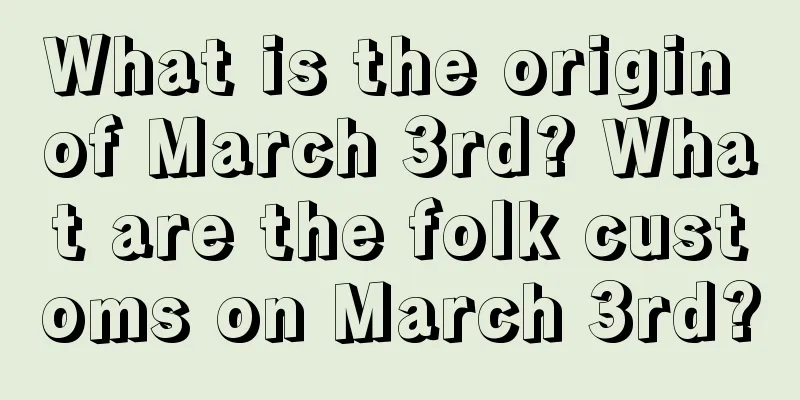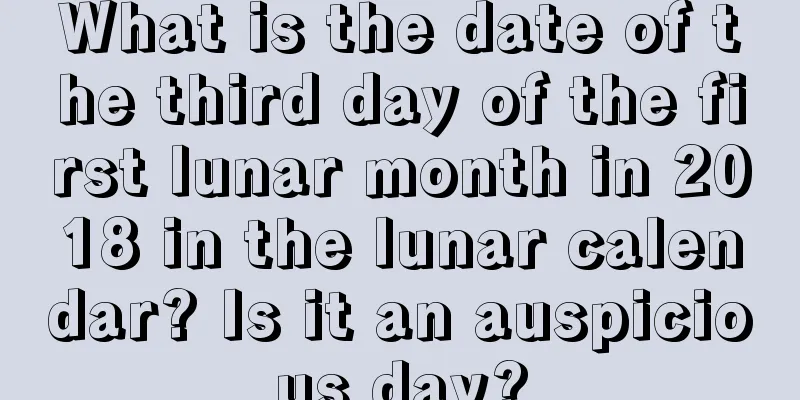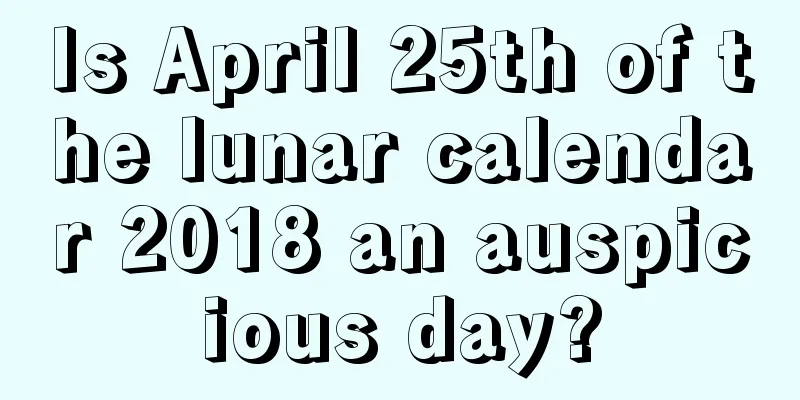What is the origin of March 3rd? What are the folk customs on March 3rd?

The ancients said: "On the second day of the second month, the dragon raises its head; on the third day of the third month, Xuanyuan is born", so the third day of the third month is a very important festival in many places. Want to know more about March 3rd? The lunar calendar is different every day, and the auspiciousness or inauspiciousness of the day will also change with the lunar calendar. Click on the special topic of March of the Lunar Calendar 2022 on Shuimoxiansheng.com to check out the lunar calendar content of March of the Lunar Calendar 2022.What is the origin of March 3rd?The third day of the third month in the lunar calendar is a traditional festival for many ethnic groups in China, among which the Zhuang ethnic group is the most typical. In ancient times, young Zhuang men and women gathered on the streets to sing and gathered by the river to feast. In Zhuang legend, March 3 is the birthday of Buluotuo, the ancestor of the Zhuang people, while for the Han people it is the Shangsi Festival. The third day of March is still a grand and solemn festival in some ethnic minority areas in southwest my country.In the Central Plains region of northern my country, there is also a saying that "On the second day of the second month, the dragon raises its head; on the third day of the third month, Xuanyuan is born." On this day every year, descendants of the Chinese nation from all over the world come to Xinzheng City, the hometown of Emperor Huang, to trace their roots and pay homage to their ancestors. The record in "The Analects of Confucius" "In late spring, when spring clothes are ready, five or six men with hats and six or seven boys go to bathe in the Yi River, enjoy the breeze in the Wu Yu Temple, and sing on their way home" and the "Qu Shui Liu Shang" in "Preface to the Lanting Pavilion" are both related to the Shangsi Festival. The third day of the third month in the lunar calendar has been recorded in writing since the Spring and Autumn Period. The Analects of Confucius said: "In late spring, when spring clothes are ready, five or six men with hats and six or seven boys go out to bathe in the Yi River, enjoy the breeze in the Wu Yu Temple, and sing on their way home." This is probably what the situation was like at that time. What are the folk customs on March 3rd?1. Han NationalityThe third day of the third month in the lunar calendar was called the Shangsi Festival in ancient times. It was a day for washing away dirt and eliminating bad luck, and was also called the Spring Bathing Day. China has a vast territory, with latitudes varying by dozens of degrees between north and south. The Yellow River Basin is at a relatively high latitude, and early March is still a relatively cold season with "the chilly weather and the evening gloom, and birds flying into the courtyard complain about the depth of spring". Not everyone can stand playing in the river naked. Probably in the Jin Dynasty, the custom of splashing water at the river was changed by literati into "Qushui Liushang". 2. Zhuang Nationality The Zhuang ethnic group celebrates March 3rd by attending singing fairs, setting up singing tents and holding singing competitions. Young men and women sang songs, tapped eggs, threw embroidered balls, and talked about love. According to legend, this festival was formed to commemorate Liu Sanjie, the singing fairy of the Zhuang ethnic group, so it is also called the "Singing Fairy Festival." The Zhuang people usually steam five-color glutinous rice on March 3rd. In addition, Ai rice cake, steamed pork with rice flour and black glutinous rice wine are the special foods of Guangxi's "March 3rd" festival. When it comes to the Zhuang ethnic group’s “March 3rd” customs, many people only know about singing and expressing love. In fact, the Zhuang ethnic group has many “March 3rd” customs. Grabbing firecrackers, throwing embroidered balls, eating five-color glutinous rice, etc. are also interesting festival customs. 3. Dong Nationality The Dong ethnic group’s “March 3rd” festival is also known as the “Sowing Festival”, “Onion-asking Festival” and “Fireworks and Firecrackers Festival”. According to the Dong legend, in ancient times they always regarded the flowering of tung trees as the rice planting festival. But one year the tung trees did not bloom, and as a result the farming season was missed, so they had to flee to the Baojing area. In order to learn from past lessons, every March 3rd people play the reed pipe and sing, visit relatives and friends, and remind each other that it is time to get busy with farm work. The Dong ethnic group often holds activities such as grabbing firecrackers, bullfighting, horse fighting, singing, and stepping on the hall on March 3rd, so it is also called the "Firecracker Festival." 4. Yao Nationality The Yao ethnic group celebrates March 3rd to commemorate national heroes, so people name this day March 3rd, also known as the "Ganba Festival." Every year before March 3rd, Yao men go to Laolin a week in advance to hunt and kill wild animals, go to the river to catch fish and shrimps, and roast them and take them home to distribute them among households so that they can share the joy of the harvest. Women went up the mountain to pick indigo leaves and other natural dyes, boiled them in water and dyed them into glutinous rice in four colors: red, yellow, blue and purple, to offer to Pangu. On the day of the festival, the Yao people put down their farm work and take a day off together. The men read scriptures, drink and have fun, while the girls and boys go to the barren hills and woods near the village to sing, play and talk about love. 5. Miao The "March 3" Miao Love Song Festival is a traditional festival of the local Miao compatriots. During the event, villagers working outside, married women and young men and women from dozens of neighboring villages will gather here to celebrate. Therefore, the "March 3" Love Song Festival is not only a festival for villagers to worship their ancestors and reunite with relatives and friends, but also a beautiful day for young people in the village to talk about love. Do you want to know your own Bazi? Want to figure out where your golden marriage is? Click on the [Premium Calculation] below to calculate your horoscope and fortune! |
<<: What can’t you do on the San Shangsi Festival in March 2022? What are the taboos on March 3rd?
Recommend
Can I give birth to a boy on the 28th day of the twelfth lunar month in 2018? What is the auspicious direction of the day?
Having a child is a major life event for every fam...
What gift should I give to my girlfriend on Chinese Valentine's Day? Is Chinese Valentine's Day in 2020 a good day?
Introduction: Chinese Valentine's Day is also ...
Is March 27th of the lunar calendar in 2022 an auspicious day? Can I pick up the new car?
Each season is divided into three months: Meng, Zh...
What day is September 15th in the lunar calendar 2018? Solar term Frost Descent?
Introduction: The specific date of the solar term ...
Is New Year’s Day a traditional Chinese festival? What is the difference between New Year’s Day and Spring Festival?
Introduction: New Year's Day is the first day ...
When is China’s Qixi Festival in 2019? What does Chinese Valentine's Day mean?
The Chinese Valentine's Day falls on the seven...
Is the sixth day of the Lunar New Year in 2021 a good day? Customs and taboos in the first month of the lunar year
Is the sixth day of the Lunar New Year in 2021 a g...
What kind of fate does a boy born on February 2 when the dragon raises its head have? Is his destiny good or bad?
Introduction: A new life is born every day, and ch...
What are the do's and don'ts on New Year's Day 2022? What are some tips for bringing good luck?
It is often said: "New Year, New Atmosphere&q...
Is Christmas Eve the same day in 2020? When is it?
Christmas and Christmas Eve are both important fes...
Is November 23rd of the lunar calendar in 2018 suitable for worshiping ancestors?
Sacrifice refers to the practice of people offerin...
What zodiac sign does June 15, 2018 belong to? What is the personality of the Leo zodiac dog?
Introduction: The twelve zodiac signs originated f...
Auspicious days for opening a business in August of 2018, a total of 10 days are suitable for new business openings
The arrival of the eighth month of the lunar calen...
Is August 1, 2019 a suitable date to pick up a car?
The eighth month of the lunar calendar is also kn...
Is it a good idea to move into the new house on the second day of Grain Full in 2020? How many days are there until Grain Full today?
Introduction: It is necessary to choose an auspici...









